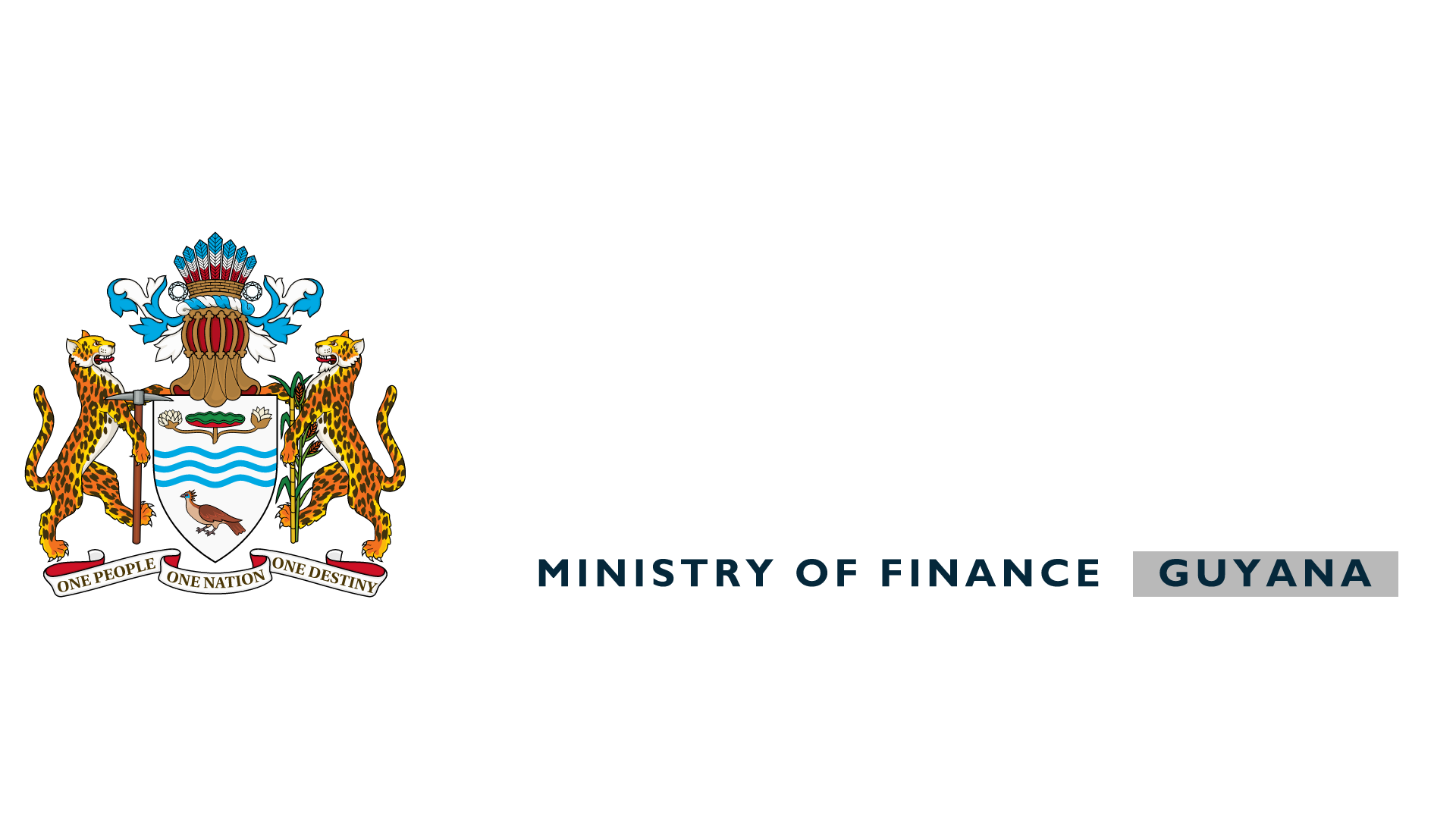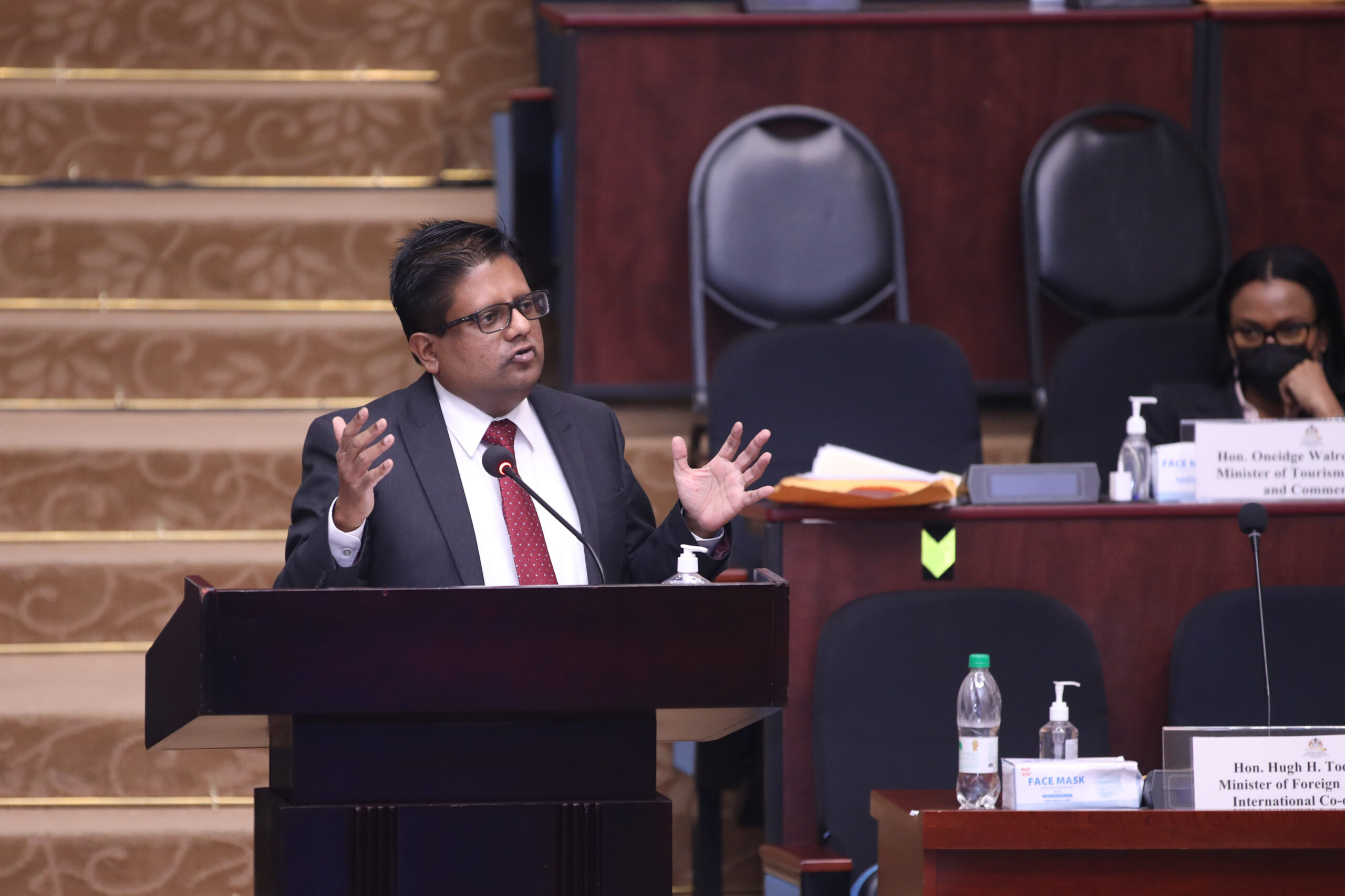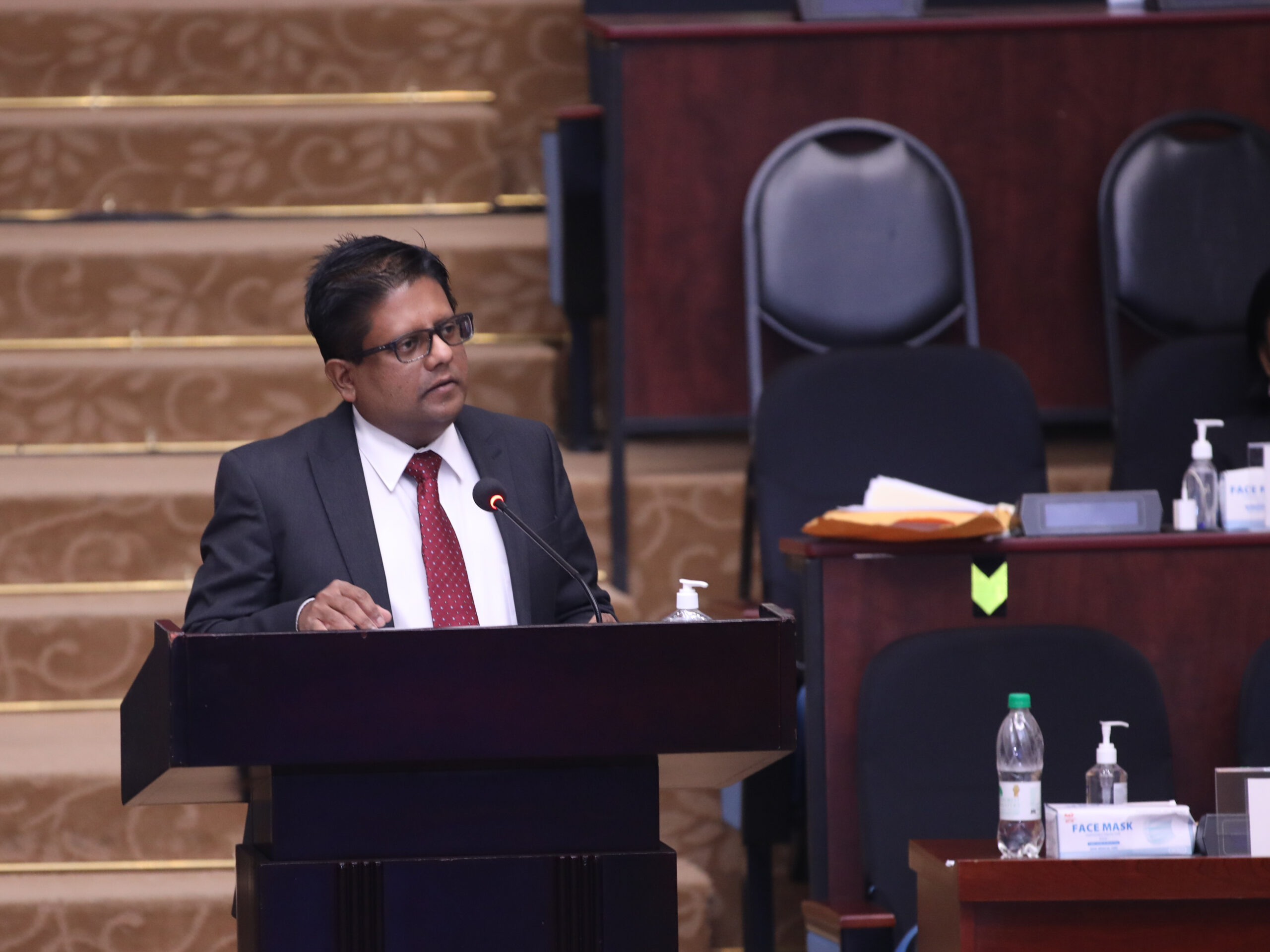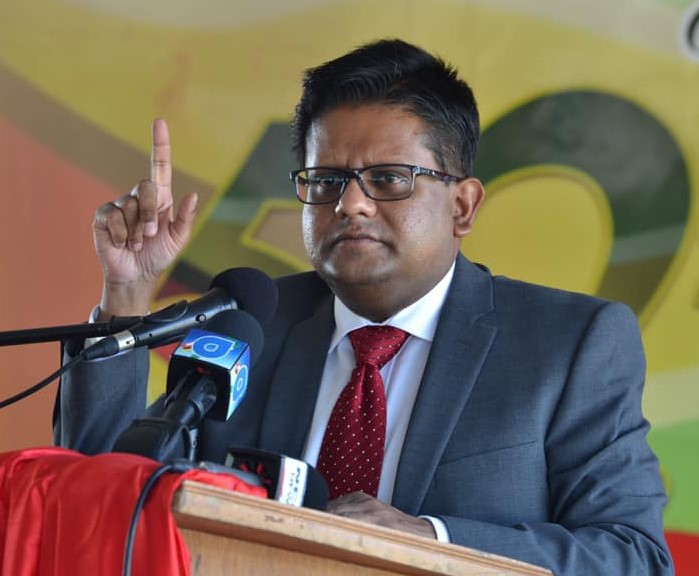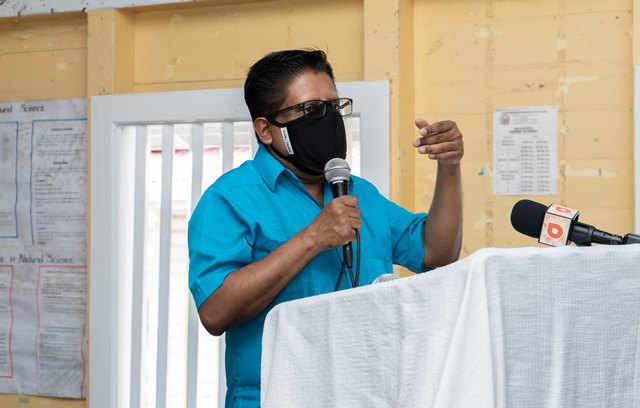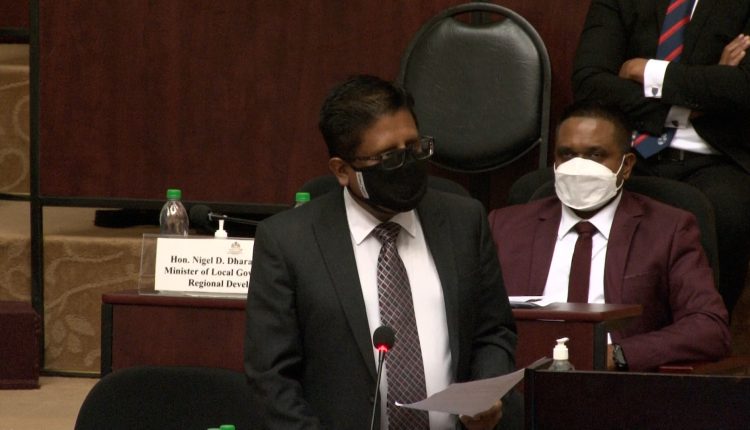Budget Speech2022 – (File Size – 15.9MB) Download
Budget Estimates 2022 – Volume 3
Volume 3 2022 – (File Size – 2.70 MB) Download
Budget Estimates 2022 – Volume 2
Volume 2 2022 – (File Size – 3.65 MB) Download
Budget Estimates 2022 – Volume 1
Volume 1 2022 – (File Size – 10.2 MB) Download
New Natural Resource Fund Bill passed in National Assembly
-despite main Opposition displaying thuggish behavior, bullyism in attempts to stall legislation
-after illegally rushing defective old Bill through Parliament following No- Confidence Motion 2018 defeat
-hiding US $18M signing Bonus later claimed to be ‘Gift’ after admitting receipt
Georgetown, Ministry of Finance, December 29, 2021:-Even after a former Minister of Finance under its tenure was charged recently with misconduct in public office for a sale at a highly undervalued amount of prime state property and incidentally being the said individual who while holding the post of Finance Minister deliberately did not disclose receipt of a US$18M signing bonus from ExxonMobil and continuing to deny same in the National Assembly until evidence emerged to prove otherwise, the A Partnership for National Unity/Alliance for Change (APNU/AFC) party now in Opposition, today chanted in full defiance of the Speaker of the National Assembly in attempts to bully the current Minister of Finance as he stood to commence the debate on the new Natural Resource Fund (NRF) Bill this evening. The new Bill seeks to pave the way for significantly improved management of Guyana’s oil revenue so as to especially ensure greater transparency and accountability. The Bill was tabled by Senior Minister in the Office of the President with responsibility for Finance, Dr. Ashni Singh on December 16 last seeking to repeal the NRF Act of 2019.
A recap of the previous Bill:
The former Natural Resources Fund Bill was illegitimately passed by the A Partnership for National Unity/Alliance for Change (APNU/AFC) in the National Assembly on January 3, 2019 after a No-Confidence Motion (NCM) was passed in Parliament against that party the month before (December 21, 2018). As such, the then Opposition (People’s Progressive Party/Civic) was not in Parliament when the Bill was approved.
In 2017, there was uproar in the public when it was unearthed that a US$18 million signature bonus had been collected by the then Government. Former Finance Minister Winston Jordan and other Government Ministers at the time had even denied ever receiving this sum until information came to light, exposing that the Ministry of Finance asked the Bank of Guyana to set up a special account in which the amount was to be placed. After reluctant admission by the APNU administration subsequently, the public was still never provided with an explanation as to what the funds were spent on, despite the monies being belatedly placed in the Consolidated Fund as required by Law and after the then Opposition took the matter to Court. With the provisions in the new Act, a situation like this could never repeat itself.
The new Bill passed today contains enhanced clauses, including a significant one which provides for the establishment of a Board of Directors that will be responsible for reviewing and approving the policies of the Fund and monitoring its performance, thereby separating the management of the Fund from the Minister responsible for finance.
Below is a table outlining the major differences between the former Bill and the one which was slated for debate this evening in the National Assembly:
Below is a table outlining the major differences between the former Bill and the one which was
slated for debate this evening in the National Assembly:
| Old NRF Bill | New NRF Bill |
|
Tabled by democratically elected Government in Parliament with full powers. |
|
Removes extensive powers from Minister and vests them in new Board of Directors. |
|
Proposes simple, clear formula that the general public can understand, ensuring complete transparency. |
|
Establishes a 9-member committee for practical and effective non-governmental oversight. |
|
Adds a new requirement that all reports and receipts of all petroleum revenues must be published in the Official Gazette. Failure to comply with this obligation results in a harsher penalty of $5 million and 10 years prison time adding greater incentives for officers to be transparent and accountable. |
One key amendment in the legislation is that the Minister of Finance could face up to ten years imprisonment if he fails to disclose the receipt of any petroleum revenue received by Government in the Official Gazette within three months of receipt of such monies.
The new law will substantially improve the management of the natural resource wealth of Guyana for the present and future benefit of all citizens.
National Assembly approves FMAA Amendment Bill piloted by Senior Finance Minister
-Budget process for Constitutional Agencies to be strengthened and streamlined while preserving their independence
Georgetown, Ministry of Finance, December 29 2021:-The Fiscal Management and Accountability Amendment Bill piloted by Senior Minister in the Office of the President with Responsibility for Finance Dr. Ashni Singh was late this evening approved in the National Assembly during the Thirty Fourth Sitting of the Twelfth Parliament. The Bill is expected to strengthen and streamline the budget process for Constitutional Agencies and simultaneous preserve the independence of those agencies. It also includes amendments which will ensure accountability and sets out the practice and procedure to which these Constitutional Agencies must conform in the management of their subventions for the efficient discharge of their functions.
For example, the Bill amends the FMAA Act Chapter 73:02 for the purpose of ‘prescribing the manner in which budgets are approved and withdrawals are made from the Consolidated Fund in respect of Constitutional Agencies’. It also includes an amendment to section 15 of the FMAA to require that an annual budget proposed to include a motion in compliance with article 218 and 222 A of the Constitution. Another amendment seeks to amend section 40 e of the Audit Act to provide for the presentation of the Audit Office Budget.
Prior to this amendment Bill, in January 2021, Minister Singh tabled a motion for an amendment to the Fiscal Management and Accountability (Amendment) Act 2021 which amended the FMAA Chapter 73:02 to allow for the correction of a number of anomalies relating to the budget process applicable to constitutional agencies.
The amendments were as a consequence of a 2015 amendment to the FMAA by the A Partnership for National Unity/Alliance for Change (APNU/AFC) during their tenure whereby constitutional agencies’ budgets were required to be sent to the National assembly in advance of the submission of the rest of the National Budget. This two-stage process resulted in a fragmented and inefficient process for consideration of the National Budget and denied the Parliament an opportunity to view and consider the budget in a comprehensive manner.
Promise kept as Government restores Joint Services Tax-free Bonus
-$1.2 Billion placed in the hands of members of the Joint Services; bonus was taken away during APNU/AFC’s tenure
Georgetown, Ministry of Finance, December 24, 2021: In another sweeping move indicating it intends to keep all of its promises, Government has restored the one-month year-end tax-free bonus to all members of the Joint Services. The announcement was earlier this week made by President Irfaan Ali at Base Camp Ayanganna during the Joint Services’ annual Christmas Luncheon where members of the Joint Services were served a special lunch by their Commander-in-Chief. The Joint Services members were elated to receive the announcement and have since been able to access the payments in time for Christmas.
Senior Finance Minister Dr. Ashni Singh at the Ministry of Finance today explained that the one-month bonus, which was a signature practice of the People’s Progressive Party/Civic (PPP/C) during its previous term in office was discontinued when the A Partnership for National Unity/Alliance for Change (APNU/AFC) administration assumed office in 2015.
In emphasizing the importance of persons receiving their bonus payments, Minister Singh also acknowledged the efforts of the many staff involved in ensuring that the payrolls of the respective agencies were processed on time. Ministry of Finance staff worked around the clock to ensure that not only all health workers received the $612 million payout announced on Tuesday but also the $1.2 billion one-month tax-free bonus announced Wednesday, which has now been placed in the hands of members of the Joint Services.
The Senior Finance Minister noted that the one-month bonus not only forms part of Government’s many other positive initiatives which have been restored since the PPP/C returned to office in August 2020, but also signifies the PPP/C’s continuous care and concern for public servants who continue to work beyond the call of duty in specific major sectors. Dr. Singh added that notably during the year-end period security is boosted countrywide especially in several shopping zones and therefore those in the security sector are again working around the clock as well as those in the health sector.
It was just over a week ago that Government completed the processing and paying out of a 7 percent across-the-board increase to all central government employees along with their December salaries which placed $10.5 billion in the hands of 50,000 public servants, teachers and members of the Disciplined Services.
Government Announces Two-Week Tax-Free Bonus for All Health Sector Employees
– a further $612 million placed in the hands of health sector workers
Senior Minister in the Office of President with Responsibility for Finance, Dr. Ashni Singh, today announced that the Government has granted approval for a one-off, two-week, tax-free, bonus to be paid to all government employees in the health sector, at a total estimated cost of $612 million benefiting 9,200 employees in the sector. Minister Singh further indicated that instructions have been issued for the bonus to be paid before the end of the current week.
Recently, at the time that the Government announced the 2021 across-the-board increase for central government employees, Minister Singh had indicated that an amount of $400 million had been set aside to be paid to frontline workers in the health sector who have continued to face extenuating circumstances in the daily discharge of their duties, as our country and the world continue to battle the ravages of the COVID-19 pandemic.
In making the final determination on the payout to the health sector employees, Government has decided to make the payment applicable to all workers in the health sector, having taken into account the challenges involved in identifying which specific posts in the health sector constitute frontline posts and which do not.
This latest announcement comes less than one week after the Government completed processing and paying the 7 percent across-the-board increase to all central government employees along with their December salaries, which placed $10.5 billion in the hands of 50,000 public servants, teachers and members of the Disciplined Services, and represents yet another tangible step taken by the Government to improve the circumstances of public sector employees and of all Guyanese more broadly.
Over 50,000 Public Servants, Teachers, Members of the Disciplined Services, and Government Pensioners paid 7 Percent Salary Increase
-Over $10.5 billion in wages and salaries paid out in December
December 18, 2021 – Over 50,000 public servants, teachers, members of the disciplined services, and government pensioners received their 2021 salary increase over the last week. The payment of the 7 percent retroactive salary increase along with the substantive December salaries and pensions placed $10.5 billion in the hands of public servants, teachers, members of the disciplined services, and government pensioners. The Senior Minister in the Office of the President with Responsibility for Finance, Dr. Ashni Singh had previously instructed that all efforts be made to ensure that eligible persons receive their salaries together with the retroactive amounts on the designated payday, and he had committed in November 2021 that the across-the-board increase of 7 percent salary increase would be paid in time for the Christmas season.
Staff of the Ministry of Finance along with staff of the respective Finance Departments across ministries and regions worked tirelessly to ensure that workers received their December salaries along with the retroactive payments in keeping with the Government’s promise. In emphasizing the importance of persons receiving their pay last week, Minister Singh also acknowledged the efforts of the many staff involved in ensuring that the payrolls of the various agencies were processed on time.
The PPP/C Government has continued to take a multifaceted approach in improving the lives and livelihoods of our citizens. This injection will also stimulate economic activity across the country as the $10.5 billion placed in the hands of employees in the public sector, will be multiplied as workers spend their increase in disposable income in markets, shops, or other businesses across the country.
Recently also, $250,000 one-off cash grant was distributed to each of the severed sugar workers from the Enmore, Skeldon, Rose Hall and Wales Sugar Estates, injecting over $1.3 billion in the surrounding communities.
Since coming into office in 2020, the PPP/C Government has implemented a number of initiatives towards improving the livelihoods of Guyanese in the face of the global COVID 19 pandemic and the real impacts of climate change. In 2020, the Government immediately implemented a COVID-19 cash grant, where $25,000 was disbursed per household. In 2021, the monthly old-age pension was increased from $20,500 to $25,000 and public assistance increased from $9,000 to $12,000. In August 2021, special measures were announced for the provision of a one-off grant of $25,000 to all old age pensioners, public assistance recipients, and persons living with disabilities. The Government restored and increased the Because We Care cash grants of $19,000 to the parents of school age children and further extended the programme to children attending private schools.
Importantly, the Government has also committed $400 million for a special 2021 payout to be made to frontline workers in the health sector who continue to support our heath sector in facing the new and ongoing challenges posed by the COVID 19 pandemic.
The Government assures its continued commitment to continuing to work assiduously to offer a better quality of life for all citizens.
New NRF Bill dismantles APNU/AFC’s architecture for Ministerial involvement and interference
– Bill strengthens transparency and oversight
December 17, 2021– The Ministry of Finance has taken note of recent pronouncements made, particularly in a page 1 comment as well as an article carried in the 17 December 2021 edition of Stabroek News, both of which can only be described misguided, hypocritical, and disingenuous.
The comment and article astonishingly express concern about the fact that the Government will be able to choose all of the members of the Board of Directors of the Natural Resource Fund. In doing so, the article conveniently chooses to ignore the fact that the previous NRF Act, which was rammed down the throats of the Guyanese people by the APNU/AFC dictatorship after they had already lost the no- confidence motion, did not even make provision for a Board of Directors. Instead, in the absence of any provision for a Board of Directors, the APNU/AFC model for the NRF was a one-man autocratic show comprising the Minister of Finance as the sole and all-powerful authority, exercising full and absolute control over the Fund.
Under the APNU/AFC model, the omnipotent Minister had exclusive power for the overall management of the Fund, including preparation and approval of its Investment Mandate, preparation of the operational agreement with the Bank of Guyana, as well as determination of the economically sustainable amount and the fiscally sustainable amount that can be withdrawn from the Fund. Bizarrely, the authors of the SN page 1 comment and article do not appear to have any difficulties with this ministerial autocracy that was established by the APNU/AFC under their NRF model, but they astonishingly have a difficulty with the PPP/C model that removes the Minister of Finance from that one-man show and introduces a Board that includes private sector representation as well as a nominee of the National Assembly.
In like manner, the comment also insinuates negativity around the withdrawal rule proposed by the PPP/C’s Bill, without taking account of the ironic fact that, at least under the PPP/C withdrawal rule the author of the SN article is able to calculate how much will be transferred, whereas under the APNU/AFC withdrawal rule the world is in the dark as to exactly how much will be withdrawn. Indeed, until the omnipotent APNU/AFC Minister decides in his sole judgement what the economically and fiscally sustainable amount will be, the entire world will be kept guessing as to what the amount to be withdrawn in any year will be.
The Ministry hereby emphasise that one of the major differences between the NRF Act 2019 and NRF Bill 2021 is that government, by removing the excessive powers of the Minister in the new Bill presented, allows for management of the Fund by the Board of Directors, a Board which will be responsible for reviewing and approving the policies of the Fund and monitoring its performance, thereby completely separating the management of the Fund from the Minister responsible for Finance. In the NRF Act 2019 these functions were the responsibility of the Finance Minister. The Ministry therefore fails to see how Stabroek News could presumptuously conclude that the key policy matters would be exclusively in the purview of the PPP/C administration.
In addition, the Directors of the Board as stipulated under Part III of the proposed Bill (Governance and Management of the Fund) “shall be selected from among persons who have wide experience and ability in legal, financial business or administrative matters, one of whom shall be nominated by the National Assembly and one of whom shall be a representative of the private sector.” The Ministry of Finance is baffled as to why the newspaper would conclude once more that the government chooses all members of the NRF Board and worse yet, how does the media house conclude that matters would be ‘exclusively in the purview of the PPP/C administration and its allies in the private sector and elsewhere.”
Another erroneous statement made by the Stabroek News in its report is that “The Board of Directors would replace the 22-member Committee in the APNU/AFC version of the NRF which was assented to by former President David Granger”.
In actuality, the 22-member Public Accountability and Oversight Committee has been replaced by a 9-member Committee which will include as stipulated in the NRF Bill 2021, and which will include a nominee of the National Assembly; three representatives of the religious community; two representatives of the private sector; two representatives of organized labour; and one representative of the professions. The proposed 9-member composition of this committee is more practical, realistic, administratively more efficient, and would provide non-governmental oversight of the fund. In comparison, the APNU/AFC 22 member committee was designed to be cumbersome and non-functional.
The NRF Bill 2021 will allow for greater accountability and transparency in the management of Guyana’s oil resources, as amendments in the proposed legislation state that the Minister could face up to ten years imprisonment if he fails to disclose the receipt of any petroleum revenue received by Government in the Official Gazette within three months of receipt of such monies. This would avoid situations like in the past where an US$18 million Signing Bonus was illegally diverted out of the consolidated fund.
The spirit and letter of NRF Bill 2021 promotes prudent management of our natural resource wealth for the benefit of both present and future generations. The proposed bill sets ceilings on withdrawals from the fund in every year except the first, specifically to secure savings for the future. However, the immediate need for sound and transformative investments in order to advantageously position our economy to ensure that the benefits from the oil and gas sector redounds towards the wider economy and all Guyanese. The solitary exception of the first year of the life of the fund takes into account the pressing development needs which must be financed, and instead of turning to the more costly option of borrowing from creditors, we can utilize our own resources for the betterment of our people.
Additionally, the mechanism to withdraw funds outlined in the NRF Bill 2021 removes the complexities and hinderances to achieving the Fund’s objectives by providing a simpler, more transparent formula for calculating the ceiling on annual withdrawals. Recall that the NRF Act 2019 was the subject of criticism from many subject matter experts, including the Inter-American Development Bank (IDB) in its publication entitled “Economic Institutions for a Resilient Caribbean” which includes a detailed assessment of Guyana’s NRF (pages 271). Amongst the observations made by that assessment were that “The formula for the maximum permissible withdrawal is among the most complex operational rules for a resource fund in the world. Its design departs from good practices”. (p. 271)
